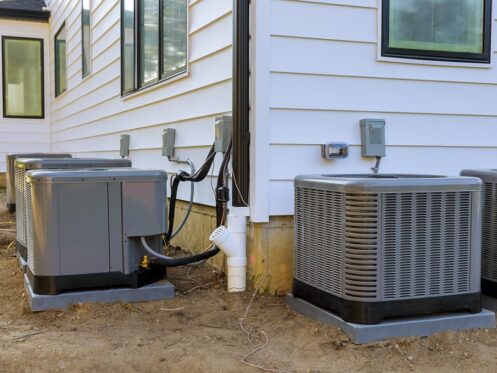Geothermal heat pumps offer an energy-efficient and environmentally friendly solution for heating and cooling homes in Wichita, KS, and the surrounding areas. Harnessing the stable ground temperatures to provide consistent heating and cooling, geothermal heat pumps deliver cost savings, enhanced comfort, and long-lasting performance.
However, with several factors to consider before investing in a geothermal heat pump system, it’s essential to take a well-informed approach to ensure you reap the full benefits.
Today, Midwest Mechanical will discuss the key considerations for selecting and installing a geothermal heat pump system that aligns with your specific needs and home requirements.
Understanding the Different Types of Geothermal Heat Pump Systems
As mentioned in the introduction, there are four main types of geothermal heat pump systems, each with their specific advantages and limitations. Let’s briefly explore each system to better understand which one may be the best fit for your home.
- Horizontal Loops: These are the most common and economical options for residential applications, especially when ample land is available. A series of underground pipes are installed in trenches at a shallow depth, allowing the heat pump to exchange heat with the ground efficiently.
- Vertical Loops: Ideal for properties with limited land space or rocky soil conditions, vertical loops involve drilling deep boreholes into the ground. Pipes are inserted vertically, providing efficient heat exchange in smaller spaces.
- Pond/Lake Loops: If your property has access to a pond or lake, this type of system can be cost-effective. Pipes are submerged underwater in a closed-loop configuration, utilizing stable water temperatures for heat exchange.
- Open-Loop: This system uses groundwater as the heat exchange fluid, pumping water from a well through the heat pump and back into the ground. Open-loop systems require a reliable and clean source of water, as well as adherence to local regulations for water use.
Assessing Ground Conditions and Landscaping Features
The performance and efficiency of a geothermal heat pump system depend on your property’s ground conditions and landscaping features. Considering the following factors before investing in a geothermal heat pump is crucial.
- Soil Type: The soil’s thermal conductivity directly impacts the system’s efficiency. Highly conductive soils, such as clay or loam, allow for more efficient heat transfer than sandy or rocky soils. Soil composition also impacts the installation costs, as rocky soils may require specialized drilling equipment for vertical loop systems.
- Depth to Bedrock: The distance between the soil surface and the bedrock affects the installation process, particularly for vertical loop systems. Shallow bedrock may complicate drilling or trenching efforts and require additional equipment or modified system designs.
- Landscaping Features: Existing landscaping elements, such as trees, slopes, or retaining walls, may impact the feasibility and cost of installing geothermal heat pump systems. Planning the installation considering these factors is essential to minimize disruptions and ensure optimal system performance.
Evaluating Energy Efficiency and Potential Cost Savings
When selecting a geothermal heat pump system, it’s crucial to consider the system’s energy efficiency, as it directly impacts your potential savings on monthly utility bills. Look for models with high COP and EER ratings, as these indicate more efficient performance.
Additionally, consider the system’s initial cost and long-term operating expenses, along with any financial incentives or rebates available in your area. By weighing energy efficiency, installation costs, and potential savings, you can make an informed decision about the right geothermal heat pump system for your home.
Working with Experienced Professionals for Guidance and Installation
Choosing and installing a geothermal heat pump system is a complex process that requires expert guidance. Collaborating with experienced professionals ensures that you receive tailored recommendations for your property and benefit from their expertise throughout the installation process. Skilled technicians can help you:
- Assess your property’s unique factors, such as ground conditions and available space, to determine the most suitable geothermal heat pump system type.
- Evaluate different systems’ energy efficiency and potential savings to identify the ideal model that aligns with your budget and performance expectations.
- Navigate financial incentives and rebates to maximize savings and expedite your return on investment.
- Ensure proper installation and setup, which is critical for optimal system performance, efficiency, and longevity. Regular maintenance and support services will keep your geothermal heat pump running efficiently for years to come.
Invest in a Geothermal Heat Pump System for Long-Term Savings and Enhanced Comfort
Selecting and installing a geothermal heat pump system is a significant investment with the potential for long-term savings and increased home comfort. By carefully considering system types, ground conditions, energy efficiency, and expert guidance, you’ll be better equipped to make an informed decision that aligns with your specific needs and home requirements.
To ensure the success of your geothermal heat pump installation, partner with our team of experienced professionals at Midwest Mechanical, who can guide you through every step of the process. Contact us today to discuss your options and discover how a geothermal heat pump in Wichita, KS, can transform your home’s heating and cooling experience!
